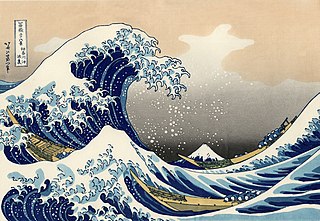
Hakushū Kitahara is the pen-name of Kitahara Ryūkichi, a Japanese tanka poet active during the Taishō and Shōwa periods of Japan. He is regarded as one of the most popular and important poets in modern Japanese literature.
Jugemu is a Japanese folktale and is one of the most famous stories in rakugo, a form of Japanese spoken entertainment. It has a simple storyline, with the most humorous part being the repetition of a ridiculously long name. It is often used in training sessions for Rakugo entertainers.
Akira Ishida is a Japanese voice actor and narrator. He was a part of Mausu Promotion from 1988 until March 2009, when he moved to Gerbera Peerless. For his portrayal of Athrun Zala in Gundam Seed Destiny, he was chosen as the most popular voice actor in the Animage Anime Grand Prix in 2004, and won the Best Supporting Character (male) award at the first Seiyu Awards in 2007.
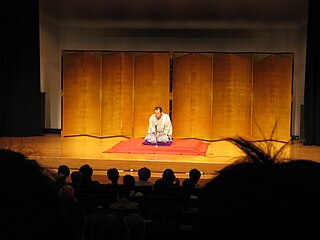
Rakugo is a form of Japanese verbal entertainment. The lone storyteller sits on stage, called kōza (高座). Using only a paper fan and a small cloth as props, and without standing up from the seiza sitting position, the rakugo artist depicts a long and complicated comical story. The story always involves the dialogue of two or more characters. The difference between the characters is depicted only through change in pitch, tone, and a slight turn of the head.
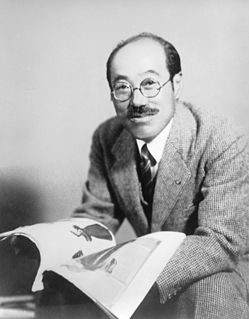
Masao Kume was a Japanese popular playwright, novelist and haiku poet active during the late Taishō and early Shōwa periods of Japan. His wife and the wife of Nagai Tatsuo were sisters.

Studio Deen Co. Ltd. is a Japanese animation studio founded in 1975 by Sunrise producer Hiroshi Hasegawa and ex-Sunrise animators. The studio owns three subsidiaries: Danny Donghua (丹尼動画), a Chinese sub-contracting company; Megumi (め組), a sub-contracting studio; and Umidori (うみどり), which does the 3DCG found in many of Deen's works.
Yū Kobayashi is a Japanese voice actress and singer affiliated with Holy Peak. Some of her most prominent roles include that of Tadamichi Aoba in Dan Doh!!, Setsuna Sakurazaki in Negima! Magister Negi Magi, Dan Kuso in Bakugan Battle Brawlers, Misaki Hijiri in Saint October, Kaede Kimura in Sayonara, Zetsubou-Sensei, among others.
Nationality words link to articles with information on the nation's poetry or literature.
Nationality words link to articles with information on the nation's poetry or literature.
Miki Sakai, born 21 February 1978 in Aoi-ku, Shizuoka, Japan is an actress and J-pop idol singer.

Masaki Okada is a Japanese actor. He is best known for his roles as Sekime Kyogo in the drama Hanazakari no Kimitachi e and as Takuma Kakinouchi in the 2009 film I Give My First Love to You.
Mitsuru Hirata is a Japanese actor. He won the award for best actor at the 7th Hochi Film Award and the award for best supporting actor at the 4th Yokohama Film Festival for Fall Guy.
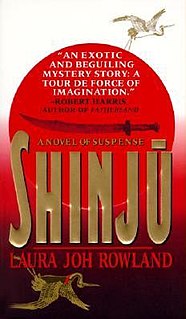
Shinjū (1994) is the title of the debut novel by American writer Laura Joh Rowland, a historical mystery set in 1689 Genroku-era Japan. The main character, a yoriki named Sano Ichirō, investigates a double murder disguised as a lovers' suicide, and in the process, uncovers a plot to assassinate Shōgun Tokugawa Tsunayoshi.
Kodansha USA Publishing is an American publishing company and subsidiary of Japanese publishing company Kodansha. Established in July 2008, Kodansha USA publishes books relating to Japan, Japanese culture, and manga, the latter under the Kodansha Comics imprint.

Waka is a type of poetry in classical Japanese literature. Waka are composed in Japanese, and are contrasted with poetry composed by Japanese poets in Classical Chinese, which are known as kanshi. Although waka in modern Japanese is written as 和歌, in the past it was also written as 倭歌, and a variant name is yamato-uta (大和歌).

Ryūka is a genre of songs and poetry originating from the Okinawa Islands, Okinawa Prefecture of southwestern Japan. Most ryūka are featured by the 8-8-8-6 syllable structure.
Events in the year 1939 in Japan.
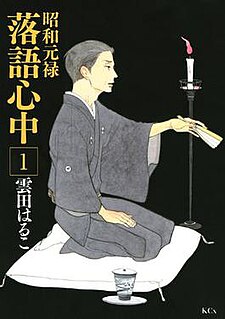
Descending Stories: Showa Genroku Rakugo Shinju is a Japanese manga series written and illustrated by Haruko Kumota. It began serialization in Kodansha's ITAN magazine in 2010. The manga is licensed in North America by Kodansha USA. The manga was adapted into two original video animations which were bundled with special editions of the seventh and eighth manga volumes on March 6 and August 7, 2015, respectively. It was also adapted into an anime television series which aired between January 9, 2016 and April 2, 2016. A second season of the anime television series aired between January 7, 2017 and March 25, 2017. A live-action series adaptation premiered on NHK on October 12, 2018.


